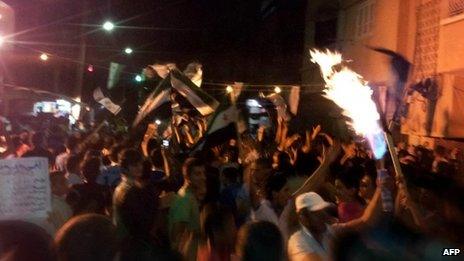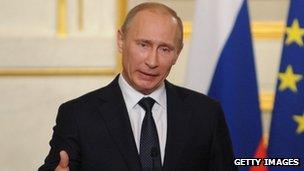A slow-motion tragedy in Syria
- Published

US Secretary of State Hillary Clinton said Russia must be at the table for a political transition in Syria to occur
Syria may be at a tipping point, as UN Special Envoy Kofi Annan cautioned early last week, following the Houla tragedy.
But in his discussions with European leaders, which continue this week, newly restored Russian President Vladimir Putin made clear Houla would not be a pivot-point for Russian policy or a catalysing moment for the international community.
Unlike Tunisia, Egypt, Libya and Yemen, which were resolved in days, weeks or months, events in Syria will grind on for months and perhaps longer.
Syrian President Bashar al-Assad may be on his "last legs", as US Ambassador to the United Nations Susan Rice suggested, but his demise will, more likely than not, be a long, painful process.
This transition, already a tragedy, will unfold in slow-motion.
Congresswoman Jane Harman says there is "little value" in the Syria peace plan
<bold>US h</bold> <bold>eadwinds</bold>
There was some anticipation that Houla - where an estimated 108 people were killed, many executed - would become for Syria what Srebrenica was for Bosnia.
After the massacre of 8,000 men and boys in Srebrenica in July 1995 an ineffectual international response turned far more intense. Within six months, a political agreement at Dayton, Ohio, ended the conflict and included a military intervention that enforced it.
But the present situation could resemble not 1995 but 1993, when the conflict was still accelerating.
International monitoring was ineffective, peace plans were developed and ignored and the international community, particularly the United States, was not yet sufficiently invested to stop it.
The first Bush administration hesitated to get significantly involved in the violent dissolution of the former Yugoslavia - former Secretary of State James Baker famously said: "We don't have a dog in this fight."
Washington sought to avoid a public confrontation with Moscow as it managed the emerging "new world order" that would soon see the Soviet Union itself disappear.
Former US President Bill Clinton was elected to fix more urgent challenges at home - "It's the economy, stupid" - not abroad.
Somalia reinforced Clinton's instinct to keep Bosnia at arm's length. But after the failure to intercede in Rwanda, confronted with the potential genocide in the Balkans, the United States became fully engaged.
Propelled by his success in Bosnia, Mr Clinton devoted much of his second term to conflict resolution from the Middle East and Northern Ireland to Africa and Asia.
If Mr Bush and Mr Clinton felt a tail-wind as the United States emerged from the Cold War with unprecedented power, President Barack Obama felt a headwind from the squandering of that power during the Iraq War and the global economic crisis.
The Obama administration has clearly, if somewhat inconsistently (much firmer with dictators than monarchs) supported the dramatic political developments that have come with the Arab Awakening.
But, while broadly engaged politically, it has presumed from the outset that the US could only affect regional change on the margins.
Case-by-case intervention
For understandable reasons, Mr Obama has been far more focused on ending wars than starting them.
The exception, of course, is Libya, although the Obama administration went to great lengths to downplay its role, even declining to term the Nato intervention as "hostilities" for domestic legal and political reasons.
Yet, Libya looms large on all sides of the Syria debate.
For the Syrians, it set high expectations that the international community would provide protection as they mounted a political challenge to the Assad regime.

Vladimir Putin has indicated Houla was not a turning point for Russia's position on Syria
Nato, backed by an Arab League request and UN Security Council resolution, not only protected the Libyan people but also directly supported the rebel advance that eventually toppled Muammar Gaddafi's regime.
If Libya, why not Syria…
The United States rejects the idea that Libya set a precedent for Syria, preferring to view all Middle East transitions on a case-by-case basis.
It remains sceptical of what can be accomplished in Syria militarily at an acceptable cost, particularly given Russian and Iranian political, economic and military support.
The ideal conditions that enabled the Libyan intervention - Arab League and UN support, and Nato and international participation - are now considered necessary pre-requisites for action in Syria.
Maybe Syria, if and when…
Cost to Russia
For its part, Europe is now engaged in an existential economic struggle centred for the moment around Greece, but potentially affecting other countries as well.
And in the eight months since Gaddafi's death, two leaders who helped launch Nato's Libya operation - France's Nicholas Sarkozy and Italy's Silvio Berlusconi - are no longer in office.
Europe is sympathetic to Syria's plight, but has its hands full.
Not now...
Another leader who allowed Libya to happen, Dmitry Medvedev, is now Russia's prime minister and no longer responsible for international affairs.
Mr Putin, who is, will block aggressive international action that threatens the status quo and Russia's already declining influence (not to mention market share) in the region.
Voicing some support for a Yemen-style solution, Russia will seek to preserve the Syrian regime with or without Assad and is willing to bear whatever political costs the United States, Europe and the Gulf states can impose at present.
Given significant divisions within the Arab League, those costs are viewed as manageable.
Not without us…
Over the weekend US Secretary of State Hillary Clinton, while criticising Russia's ongoing support of the Assad regime, reiterated that Russia must be at the table for a political transition to occur.
Now back in the game, Mr Putin appears to be in no hurry to deal. Whether or not this is good for Russia, it is tragic for the Syrian people.
<italic>PJ Crowley is a former US Assistant Secretary of State </italic> <italic>in the administration of President Barack Obama</italic> <italic>.</italic>
- Published29 May 2012
- Published1 June 2012
- Published9 April 2012